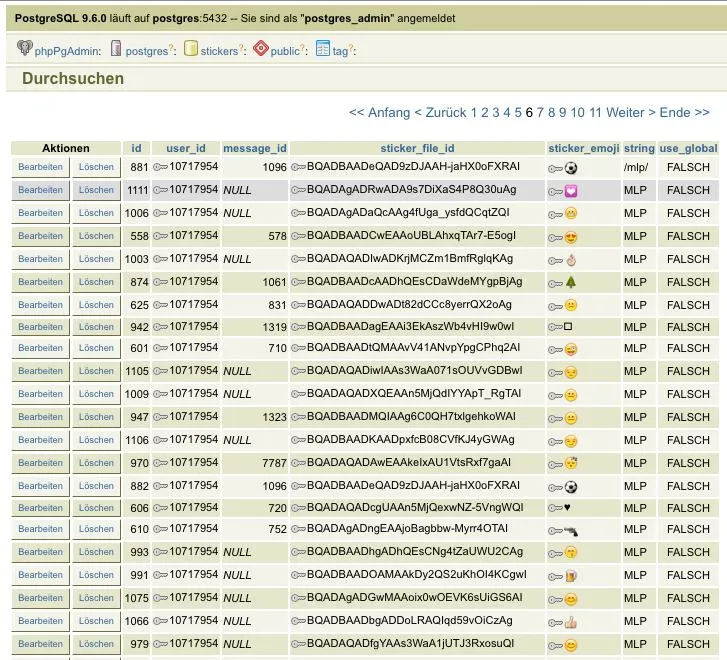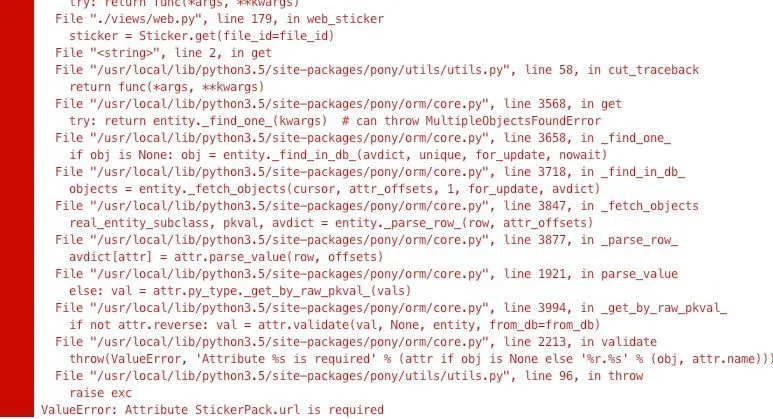 Alexey
Alexey
Awesome, works!
@luckydonald how do you find the resulting query witten with Pony? does it look simple and understandable for you?
 Lucky
Lucky
@luckydonald how do you find the resulting query witten with Pony? does it look simple and understandable for you?
It is a bit long. Yeah.
But I think that comes with the complexity of the task.
 Alexey
Alexey
it would be interesting to compare this good real-life example of a long query with one written with other mappers
 Alexander
Alexander
It is not necessary to use two `for`s here. The query can be rewritten as:
orm.select(
(st.sticker.file_id, max(st.date))
for st in StickerMessage
if (query_text == st.sticker.emoji
or orm.exists(t for t in st.sticker.tags if query_text.lower() in t.string.lower()))
and not orm.exists(t for t in st.sticker.tags if t.string.lower() == "nsfw")
).order_by(orm.desc(2), 1).limit(50, offset=offset)
Also, I don't think it is good to calculate t.string.lower() inside query, it is better to pre-calculate it in a separate column. If it is possible to check this string for exact equality instead of substring test, the query can be expressed a bit simpler:
orm.select(
(st.sticker.file_id, max(st.date))
for st in StickerMessage
if (query_text == st.sticker.emoji or query_string.lower() in st.sticker.tags.lowerercase)
and "nsfw" not in st.sticker.tags.lowercase)
).order_by(orm.desc(2), 1).limit(50, offset=offset)
 Lucky
Lucky
How can I specify a contraint on multible colums to be unique?
I want Tag.string, .user, .message_id to be together unique.
 Lucky
Lucky
 Lucky
Lucky
I can't get COUNT to work... :/
orm.select((t.string, orm.count(t.string)) for t in Tag).order_by(orm.desc(2), 1)
This returns ["MLP", 1] But the database definitly contains more than one
 Lucky
Lucky
 Alexander
Alexander
When a specific attribute is specified inside count, pony counts distinct values of that attribute. In order to count total number of rows just write count() without any arguments, it translates to COUNT(*)
 Alexander
Alexander
then do 'select((t.string, orm.count()) for t in ...)'
or 'select((t.string, orm.count(t)) for t in ...)'
 Alexander
Alexander
The former query means "for each string count number of rows", the later one means "for each string count number of distinct Tag objects", the result should be the same in your case
 Serg
Serg
"In this case, even though the object had already been loaded to the cache, the query still had to be sent to the database because the name attribute is not a unique key. The database session cache will only be used if we lookup an object by its primary or unique key." https://docs.ponyorm.com/firststeps.html#getting-objects
If object would be in the cache and someone would change this row in database would be cached object updated or not?
 Serg
Serg
I think here is answer on my questions https://docs.ponyorm.com/transactions.html#optimistic-concurrency-control
 Alexander
Alexander
If Pony read an object which was already loaded in a current db_session, then Pony checks whether an attributes still holds the same value. There are four possible situations:
1) The column value is the same as previously, Pony does nothing;
2) The column value is updated in the database, but the attribute value was no read or modified by application code. In that case Pony updates the attribute value silently.
3) The application code has already read previous value of the attribute. In that case, it is possible that current state of db_session depends on the obsolete value which was read from the attribute, and to prevent possible inconsistency Pony throws UnrepeatableRead exception.
4) The value of column in the database is changed. An application code already assign a new value to the attribute without reading the previous value. In that case the "db value" of attribute will be updated silently and later during COMMIT it will be overwritten by newly assigned value
 Serg
Serg
Thank you @akozlovsky for that clear explanation. By the way, I reed that you planned to include GrapQL into new PonyORM relase. When I see GraphQL query it seems stict and clear:
type Project {
name: String
tagline: String
contributors: [User]
}
In Python 3.6 will be variable annotaion, and table defination code coul be like this:
 Alexander
Alexander
Type is just a part of the information about attribute. Beside type, there are many other things, like is it nullable, is it unique, what a maximul leghts of a string attribute, etc. Regarding collection attributes, currently we have Set attributes only, but in the future we plan to add List attributes as well, so the square bracket syntax is not enough to declare all necessary information
 Romet
Romet
@akozlovsky with the new annotation system you can also just create custom types for annotation purposes
 stsouko
stsouko
class Structures(db.Entity):
id = PrimaryKey(int, auto=True)
data = Required(LongStr)
reagents = Set('Reactions', reverse='reagents')
products = Set('Reactions', reverse='products')
class Reactions(db.Entity):
id = PrimaryKey(int, auto=True)
reagents = Set(Structures, reverse='reagents')
products = Set(Structures, reverse='products')
 Alexander
Alexander
Currently Set collections are unordered. You can get ordered list of items if you performs a query:
r.reagents.select().order_by(lambda r: r.id)[:]
 Alexander
Alexander
By the way it is better to name all entities in a singlular form: Structure, Reagent, etc.
 Alexander
Alexander
Also, it looks strange that both end of relation have the same name:
Structure.reagents <-> Reaction.reagents
Structure.products <-> Reaction.products
Typically the name is different, like:
Student.courses <-> Course.students
 Lucky
Lucky
 stsouko
stsouko
Thanks. But this recipe order objects by structures. This is chemical db. Any reaction have reagents and products. And any structures may be in reagent role or product
 Alexander
Alexander
Ok, now I understand. I think you should not replace many-to-many with several many-to-one, it will be not correct. I think your current scheme is good
 Lucky
Lucky

 Alexander
Alexander
I think this is a bug, and I'll fix it.
The reason for the error is: the attribute is specified as required, but in the database its value for some object is empty string. So when Pony attempts to load that object from the database it encounters validation error.
I'll change that behavior so Pony will ignore the error for empty string values loaded from the database.
 Serge
Serge
 Lucky
Lucky
 Lucky
Lucky
Yeah, the value was set with a java client, where there is no such nice framework.
(I was really sad)
 Lucky
Lucky
Until then pip install -e git://github.com/ponyorm/pony.git@dfedd28d02330fb351dc019f4dd03134299c23ab#egg=pony will work





 Павел
Павел
